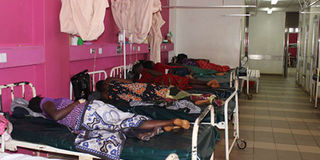Hospital births, vaccination visits drop as Kenya battles virus

Pregnant women receive care at Kisii Teaching and Referral Hospital. PHOTO | FILE | NATION MEDIA GROUP
What you need to know:
- The health system is also strained, with resources meant to serve women and children being reallocated to the fight the virus.
- Healthcare workers are concerned that expectant mothers are reverting to the use of traditional birth attendants, who are ill-equipped.
A paltry three out of 10 women gave birth in hospitals last month, pointing to a worrying trend that could morph into a crisis.
Worse still, only five out of 10 children under one year were fully immunised, and only six women out of 10 went for their fourth antenatal care in hospitals in the month.
Data from various hospitals revealed that the months of January and March had good performance, but with only 32 per cent of women being attended to by skilled birth attendants in April, it means the rest gave birth unattended, or were assisted by traditional or unskilled birth attendants.
As Kenya and the rest of the world reel from the devastating effects of the Covid-19 pandemic, pregnant women, afraid to contract the disease in hospitals or unable to access health facilities due to movement restrictions, have opted to deliver their babies at home.
The health system is also strained, with resources meant to serve women and children being reallocated to the fight the virus.
United Nations Children’s Fund (Unicef) Executive Director Henrietta Fore posted a statement on the organisation’s website, observing: “As the pandemic progresses, critical life-saving services, including immunisation, will likely be disrupted, especially in Africa, Asia and the Middle East where they are sorely needed.”
Acting Health Director-General Patrick Amoth concurred. “We’re going to see a huge number of children who are not immunised in future, and this means that when an attack, for instance of cholera, occurs, the likelihood of them surviving is minimal. Giving birth at home and denying your child the necessary vaccination is inviting a huge problem in future."
SAFETY PROVIDED
The fear of seeking medical help at night could have been triggered by the events of the first day of the curfew, when police violently enforced it, sending a chilling message to Kenyans.
To assure women that services are not interrupted, the government last week issued guidelines to ensure services for mothers and children remain accessible.
“Government will continue with routine immunisation services countrywide during the Covid-19 outbreak and will use the smaller, less crowded levels two and three facilities,” the guidelines state.
Council of Governor’s Chairman Wycliffe Oparanya also assured Kenyans of their safety when visiting hospitals.
“We have ensured that other healthcare services in all our facilities are not interrupted, and taken measures to protect patients against Covid-19 infection at the health facilities,” he said.
At Kenyatta National Hospital, a comparison of figures from last year with this year’s for the months of April and May shows a significant drop.
In April 2019, the paediatric emergency unit attended to 3,239 children while this year it only attended to 674. For May, the numbers dropped from 2,905 in 2019 to 390 this year.
BIRTH ATTENDANTS
At the paediatric immunisation unit, a total of 1,558 children were immunised in April last year, against 889 this year. In May this year, only 413 children have been immunised, against a total of 1,617 last year.
The case was the same at the Jaramogi Oginga Odinga Teaching and Referral Hospital with the facility recording a 60 per cent drop in births.
“In April last year, we had a total of 1,000 births and this has since reduced by 400. Most women are not coming to delivery in hospitals and this should worry us because once they give birth at home and they develop a complication, it becomes very difficult to arrest the situation” Dr Peter Okoth, the hospital’s chief executive officer said.
However, at Mama Lucy Kibaki Hospital in Nairobi, the number of deliveries has gone up by about 20 deliveries in a day. This is largely being seen as a consequence of the lockdown in Eastleigh, where Pumwani Maternity Hospital is located.
“We were [previously] attending to about 30 women in a day, but now it has increased to 50 a day, but the numbers have reduced at Pumwani. We are overstretched, but we can manage,” said Dr Ouma Oluga, Nairobi Metropolitan Service Chief Health Officer.
Healthcare workers are concerned that expectant mothers are reverting to the use of traditional birth attendants, who are ill-equipped for complications during delivery, should they occur.
Ms Regina Akinyi, a birth attendant, has been attending to expectant women. She said she has attended to more than 50 women in the last two months.
The women are afraid of getting the virus in hospitals, she says, and vows to help any mother that calls on her any time.
“We’re not going to let them suffer or die at home, yet we’re here. I’ve been trained and I’ve the knowledge to take care of the women. No woman has ever died in my hands,” she said.




